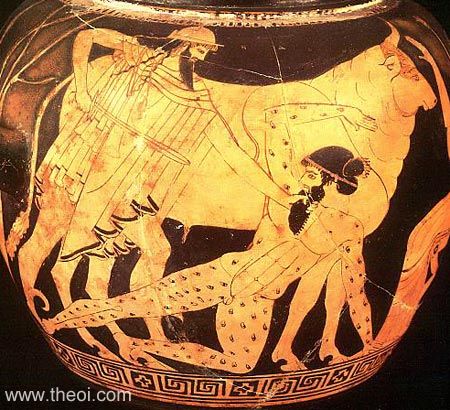Gaius Julius Hyginus
64 BC – 17 AD was a freedman and head
the Palatine library. He was an industrious writer, but all of his works
are lost. His work on mythology has been
summarized by someone in the second century AD and is now known as the Fabulae, a title probably given by Jacob
Mycellus, the first to print work in 1535. The copyist is thought to be a
schoolboy, as the Latin shows errors. The text has survived in a single
manuscript: many scholars dearly wish that instead of this excerpt some now
lost play by one of the Greek tragedians had survived. The original work of
Hyginus must have been highly popular as a compendium of mythology, so why did
an abstract survive and not the original? Probably for this simple reason: copying was
expensive and copying a mere abstract was cheaper. I guess Hyginus would rather
have his mythography not to have survived in this poor abstract.
I am currently reading the Prometheus Vinctus by Aeschylus, in which poor Io is a main character.
Io was a nymph turned into a cow by Zeus, in order that his ever jealous wife Hera
might not recognize her. Of course she did and by various means she was chasing
her all over the world, until Io reached Egypt and got her original beauty back.
The story is brought back to its very bones and many
important traits are left unmentioned, like her meeting with the chained Prometheus
at mount Caucasus. Io will be the ancestress of Hercules, who will free Prometheus
in the far future.
The origin of Io is unclear – as is often the case with
Greek mythology, because many pre-Greek gods and goddesses have been assimilated
into the Greek Pantheon. Io was connected with the moon and hence her
identification with Isis, the Egyptian moon-goddess.
Hyginus, Fabulae,
Io
Ex Inacho et
Argia Io. Hanc Iuppiter dilectam compressit et in vaccae figuram convertit, ne
Iuno eam cognosceret. Id Iuno cum rescivit, Argum, cui undique oculi
refulgebant, custodem ei misit; hunc Mercurius Iovis iussu interfecit. At Iuno
formidinem ei misit, cuius timore exagitatam coegit eam, ut se in mare
praecipitaret, quod mare Ionium est appellatum. Inde in Scythiam tranavit, unde Bosporum fines
sunt dictae. Inde in Aegyptum, ubi parit Epaphum. Iovis cum sciret suapte
propter opera tot eam aerumnas tulisse, formam suam ei propriam restituit
deamque Aegyptiorum eam fecit, quae Isis nuncupatur.
dilectus: loved
comprimo compressi compressum: to
subdue
vacca: cow
rescisco rescivi:
to find out
Argus: guardian
of Io. He had a100 eyes
undique: from
all sides
refulgeo refulsi:
to glitter
custos custodis
(m. and f.): guard
interficio
interfeci interfectum: to kill
formido forminidis
(f.): fear, something bringing fear; in this case the gadfly sent by Hera
cuius timore
exagitatam coegit eam: she (Iuno) forced her, vexed by fear for that
(gadfly)
praecipito: to
cast down
trano: to swim
across
pario peperi
partum: to give birth
Epaphus: the
father is Zeus
Iovis cum sciret
suapte propter opera tot eam aerumnas tulisse: when Zeus (Iovis is here nominative!) got to know
that she had suffered that many tribulations because of his very own (sua-pte ) deeds
propius: own
nuncupo : to call (nomen
capio)

Io as a heifer & Hermes slaying Argus, Athenian red figure vase C5th B.C., Kunsthistoriche Museum, Vienna